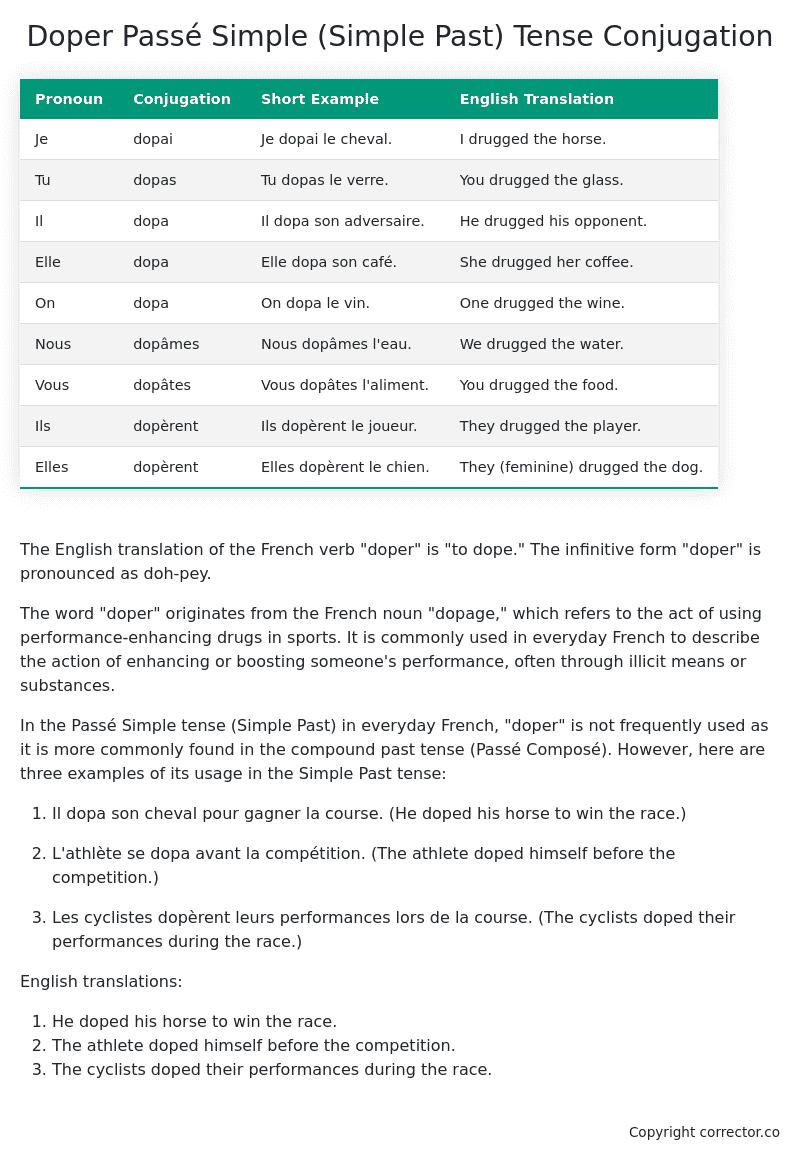Passé Simple (Simple Past) Tense Conjugation of the French Verb doper
Introduction to the verb doper
The English translation of the French verb “doper” is “to dope.” The infinitive form “doper” is pronounced as doh-pey.
The word “doper” originates from the French noun “dopage,” which refers to the act of using performance-enhancing drugs in sports. It is commonly used in everyday French to describe the action of enhancing or boosting someone’s performance, often through illicit means or substances.
In the Passé Simple tense (Simple Past) in everyday French, “doper” is not frequently used as it is more commonly found in the compound past tense (Passé Composé). However, here are three examples of its usage in the Simple Past tense:
-
Il dopa son cheval pour gagner la course.
(He doped his horse to win the race.) -
L’athlète se dopa avant la compétition.
(The athlete doped himself before the competition.) -
Les cyclistes dopèrent leurs performances lors de la course.
(The cyclists doped their performances during the race.)
English translations:
- He doped his horse to win the race.
- The athlete doped himself before the competition.
- The cyclists doped their performances during the race.
Table of the Passé Simple (Simple Past) Tense Conjugation of doper
| Pronoun | Conjugation | Short Example | English Translation |
|---|---|---|---|
| Je | dopai | Je dopai le cheval. | I drugged the horse. |
| Tu | dopas | Tu dopas le verre. | You drugged the glass. |
| Il | dopa | Il dopa son adversaire. | He drugged his opponent. |
| Elle | dopa | Elle dopa son café. | She drugged her coffee. |
| On | dopa | On dopa le vin. | One drugged the wine. |
| Nous | dopâmes | Nous dopâmes l’eau. | We drugged the water. |
| Vous | dopâtes | Vous dopâtes l’aliment. | You drugged the food. |
| Ils | dopèrent | Ils dopèrent le joueur. | They drugged the player. |
| Elles | dopèrent | Elles dopèrent le chien. | They (feminine) drugged the dog. |
Other Conjugations for Doper.
Le Present (Present Tense) Conjugation of the French Verb doper
Imparfait (Imperfect) Tense Conjugation of the French Verb doper
Passé Simple (Simple Past) Tense Conjugation of the French Verb doper (You’re reading it right now!)
Passé Composé (Present Perfect) Tense Conjugation of the French Verb doper
Futur Simple (Simple Future) Tense Conjugation of the French Verb doper
Futur Proche (Near Future) Tense Conjugation of the French Verb doper
Plus-que-parfait (Pluperfect) Tense Conjugation of the French Verb doper
Passé Antérieur (Past Anterior) Tense Conjugation of the French Verb doper
Futur Antérieur (Future Anterior) Tense Conjugation of the French Verb doper
Subjonctif Présent (Subjunctive Present) Tense Conjugation of the French Verb doper
Subjonctif Passé (Subjunctive Past) Tense Conjugation of the French Verb doper
Subjonctif Imparfait (Subjunctive Imperfect) Tense Conjugation of the French Verb doper
Subjonctif Plus-que-parfait (Subjunctive Pluperfect) Tense Conjugation of the French Verb doper
Conditionnel Présent (Conditional Present) Tense Conjugation of the French Verb doper
Conditionnel Passé (Conditional Past) Tense Conjugation of the French Verb doper
Conditionnel Passé II (Conditional Past II) Tense Conjugation of the French Verb doper
L’impératif Présent (Imperative Present) Tense Conjugation of the French Verb doper
L’impératif Passé (Imperative Past) Tense Conjugation of the French Verb doper
L’infinitif Présent (Infinitive Present) Tense Conjugation of the French Verb doper
L’infinitif Passé (Infinitive Past) Tense Conjugation of the French Verb doper
Le Participe Présent (Present Participle) Tense Conjugation of the French Verb doper
Le Participe Passé (Past Participle) Tense Conjugation of the French Verb doper
Struggling with French verbs or the language in general? Why not use our free French Grammar Checker – no registration required!
Get a FREE Download Study Sheet of this Conjugation 🔥
Simply right click the image below, click “save image” and get your free reference for the doper Passé Simple tense conjugation!

Doper – About the French Passé Simple (Simple Past) Tense
Formation
Usage
Narration
Historical Context
Interactions with other tenses
Passé Composé
Imparfait
Conditional and Subjunctive
Summary
I hope you enjoyed this article on the verb doper. Still in a learning mood? Check out another TOTALLY random French verb conjugation!


